
Gretna
Formed 1946. Wound up August 2008
Elected to Scottish Division Three 2002. Resigned June 2008.
Kit History
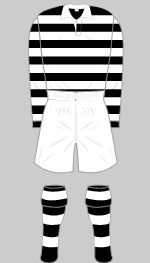
1947-1952 a g

1952-1966
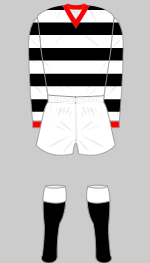
1966-1967 a

1967-1974
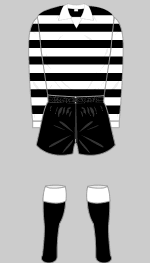
1974-1975 g
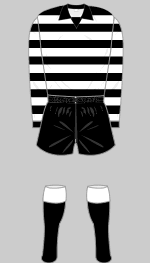
1975-1981 g
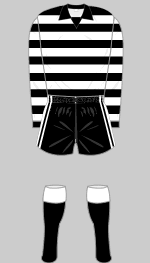
1981-1982 g

1982-1983 g
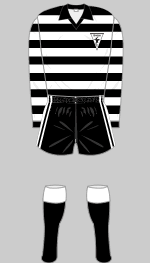
1983-1984 g
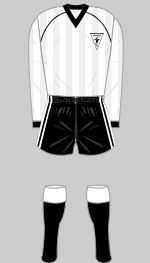
1985-1987 g
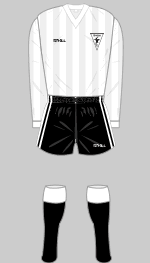
1987-1988 g
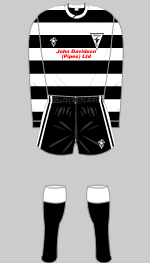
1988-1991 f g
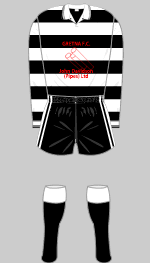
1991-Sept'92 a g
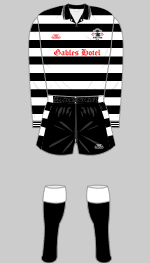
Oct'92-1994 g

1994-Nov 1996 g
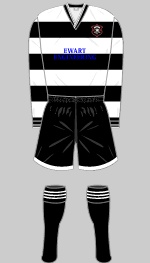
Dec 1996-1998 g
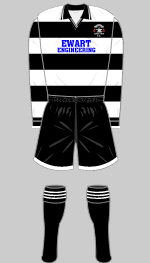
1998-2000 g
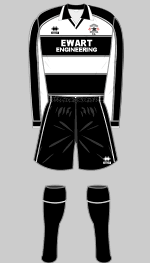
2000-2001 g
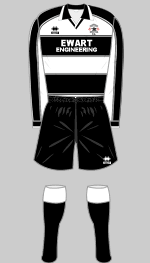
2001-2002 g
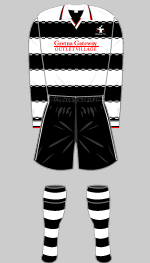
2002-2003 e g
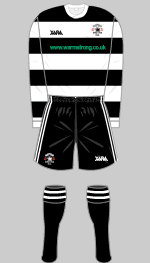
2003-2004 c d g
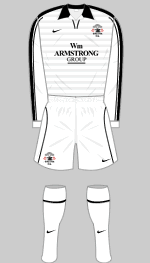
2004-2006 b
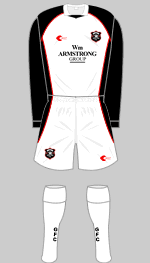
2006-2007 a
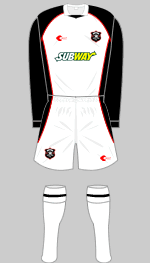
2007-2008 a h
Background
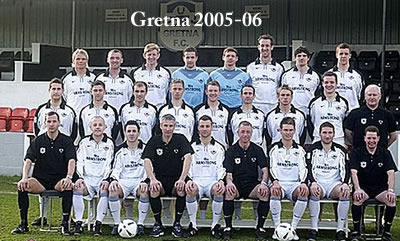 The border village of Gretna holds an enduring place in British popular history. In 1754 Parliament passed the Hardwicke Marriage Act which required anyone below the age of 21 to have parental consent before they could marry. This law did not apply in Scotland where boys aged 14 and girls aged 12 could marry without parental consent. Practically anyone could conduct a marriage as long as two witnesses were present. When a tollroad was built in the 1770s, Gretna became the most accessible destination for eloping English couples to legally marry and by popular folklore most of these marriages were conducted in the blacksmith's workshop.
The border village of Gretna holds an enduring place in British popular history. In 1754 Parliament passed the Hardwicke Marriage Act which required anyone below the age of 21 to have parental consent before they could marry. This law did not apply in Scotland where boys aged 14 and girls aged 12 could marry without parental consent. Practically anyone could conduct a marriage as long as two witnesses were present. When a tollroad was built in the 1770s, Gretna became the most accessible destination for eloping English couples to legally marry and by popular folklore most of these marriages were conducted in the blacksmith's workshop.
In July 1946 Gretna football club was formed and entered the Dumfries Junior League. The following season, they took the unusual decision to join the Carlisle & District League where they remained until 1982. After winnning the title on six consecutive occasions, it was clear that Gretna had outgrown this local competition and they stepped up to join the new Second Division of the Northern League, investing £100,000 in ground improvements. This was an enormous sum for such a small club and one which signalled their ambition.
Gretna were promoted at the first attempt and spent nine seasons in
the Northern League First Division, winning the title in 1991 and 1992,
when the Northern League belatedly opted into the English non-League 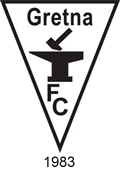 pyramid,
ensuring that the club was promoted to the Northern Premier League.
pyramid,
ensuring that the club was promoted to the Northern Premier League.
The first evidence we have of a crest comes from 1992-93, a simple triangular affair with a blacksmith's anvil, symbolising the popular tradition of the "anvil priests" who had the authority to conduct marriages.
In 1988 they met Rangers in a charity match to raise money for the victims of the previous year's air disaster at nearby Lockerbie, a match they won 2-1. In 1993 and 1999 Gretna applied for membership of the Scottish League but they were not successful.
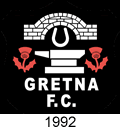 It is unclear when a more modern crest was introduced but HFK believes this may have first appeared in 1992. This was printed in black or white depending on which hoop it appeared out of.
It is unclear when a more modern crest was introduced but HFK believes this may have first appeared in 1992. This was printed in black or white depending on which hoop it appeared out of.
In 2002, having finished in seventh position in what was now the Unibond
League, Gretna
made another application to join the Scottish League. On this occasion
the demise of Airdrieonians had created a vacancy. The newly formed
Airdrie United also submitted an application but the members preferred
the proven track record and ambitious programme of the club from Dumfries
& Galloway so Gretna, having spent almost their entire career playing
in England, found themselves members of the Scottish Football League.
Local businessman and managing director, Brooks 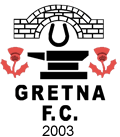 Mileson, who had taken over the club, made it clear
that he would take Gretna to the top level and he was prepared to
put up the cash to make this happen. The remarkable Mileson, reputedly
worth £75m, was something of a football philanthropist: he
made many substantial donations to various football trusts and put in
place a unique arrangement to sponsor the Northern League for the rest
of his life.
Mileson, who had taken over the club, made it clear
that he would take Gretna to the top level and he was prepared to
put up the cash to make this happen. The remarkable Mileson, reputedly
worth £75m, was something of a football philanthropist: he
made many substantial donations to various football trusts and put in
place a unique arrangement to sponsor the Northern League for the rest
of his life.
In 2005 Gretna stormed to the Scottish Third
Division title with a record 80 points. The following season they won
the Second Division championship by a clear 18 points and reached the
final of the Tennant's Scottish FA Cup where they took Premier League
Hearts to extra-time before finally losing out in the penalty competition.
Since Hearts had already qualified 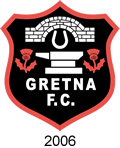 for the Champions League, Gretna
took their place in the UEFA Cup the following season.
for the Champions League, Gretna
took their place in the UEFA Cup the following season.
Plans to redevelop their Raydale Park into a 6,000 all-seated stadium to meet Scottish Premier League standards, large enough to hold the entire population of Gretna three times over, were revealed in 2006. When Gretna won promotion to the SPL in 2007 they were forced to ground share with Motherwell at Fir Park while their new ground was prepared. This proved to be their undoing. The team struggled at the foot of the Premier League, well adrift of the rest and few supporters were prepared to make the 180 mile round trip to Fir Park to watch them lose. Ill-health led Brooks Mileson to step down as chairman and the funds that had kept the club afloat dried up. In March 2008, Gretna FC announced that they would enter financial administration, incurring a ten-point penalty (irrelevant as only a mathematical miracle could have saved them from relegation at this stage). An advance on their end-of-season payout from the SFL allowed them to continue to pay their players and complete their fixtures. At the end of the season every single member of staff was made redundant. Attempts to keep the club alive foundered after the SFL announced that the club would have to play in the Third Division the following season because the ground did not meet the required standard and the club's administrators could not guarantee that they would fulfill their fixtures.
Gretna's meteroic rise was not universally popular and their collapse in 2008 is seen by their critics as the consequence of the club overeaching itself. Certainly, without the millions invested by Mileson, Gretna would still be a very modest club indeed while the SPL members themselves would undoubtedly have preferred a club able to attract a greater number of fans. Nevertheless, the remarkable rise of this little club demonstrates that, given ambition and financial backing, it is perfectly possible to rise all the way through the Scottish League system. At the same time, if that financial backing is not sustainable and the club lacks a substantial fan base, that success will be fragile indeed.
Once it became clear that the old club could not be rescued, Gretna's Supporters Association set up Gretna 2008 FC. The new team plays in Annan and was admitted to the East of Scotland League First Division.
Sources
- (a) Gretna FC Official Site
- (b) upyarkilt.com
- (c) Colours of Football
- (d) Peterhead FC Official Site
- (e) Kit Classics
- (f) Ralph Pomeroy
- (g) Alick Milne (HFK Research Associate)
- (h) Ian McConnel
i In the 1997-98 season some shirts had the hoops reversed. These shirts were alongside the original versions.
Photograph courtesy of upyarkilt.com